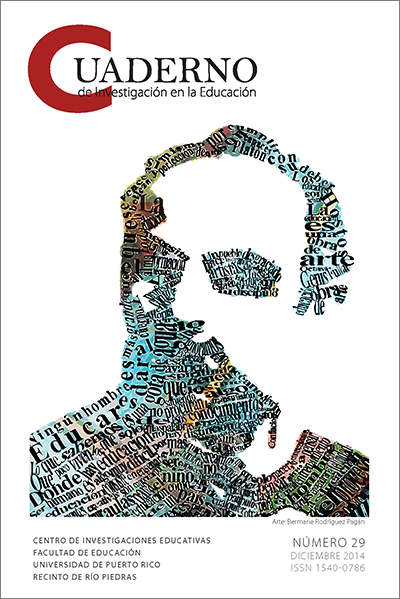Resumen
Presentación de Teresa McCarty en el Tercer Congreso de Revistas Académicas.
Cómo citar:
McCarty, T. (2014). Academic journals and the work of editorial boards: An invitation to dialogue. Cuaderno de Investigación en la Educación, 29, 112-123. Recuperado a partir de https://revistas.upr.edu/index.php/educacion/article/view/13258
Citas
Kaulbach, B. (1984). Styles of learning among Native children: A review of the research. Canadian Journal of Native Education, 11, 27-37.
Lomawaima, K.T., & McCarty, T.L. (2006). "To remain an Indian": Lessons in democracy from a century of Native American education. New York, NY: Teachers College Press.
Marashio, P. (1982). "Enlighten my mind…" Examining the learning process through Native Americans‘ ways. Journal of American Indian Education, 21, 2-9.
McCarty, T.L., Faircloth, S.C., Glass, G.V., Ladwig, J., Lee, S.J., McNaughton, S., Parker, L., & Villenas, S.A. (2014). As we embark on a new editorship: A statement from the AERJ-SIA editors. American Educational Research Journal, 51(1), 4-6.
McCarty, T. L., Wallace, S., Lynch, R. H., & Benally, A. (1991). Classroom inquiry and Navajo learning styles: A call for reassessment. Anthropology and Education Quarterly, 22(1), 42-59.
McShane, D. A., & Plas, J. M. (1984). The cognitive functioning of American Indian children: Moving from the WISC to the WISC-R. School Psychology Review, 13, 61-73.
More, A. J. (1989, August). Native Indian learning styles: A review for researchers and teachers [Special issue]. Journal of American Indian Education, 15-28.
Ross, A. C. (1989, August). Brain hemispheric functions and the Native American [Special Edition]. Journal of American Indian Education, 72-76.

Esta obra está bajo una licencia internacional Creative Commons Atribución-NoComercial 4.0.
Derechos de autor 2014 Cuaderno de Investigación en la Educación

